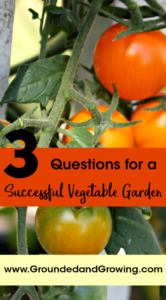 Dreaming of finally planting a vegetable garden this year but not sure where to start? Build a solid foundation for garden success with honest answers to these three questions.
Dreaming of finally planting a vegetable garden this year but not sure where to start? Build a solid foundation for garden success with honest answers to these three questions.
This post contains affiliate links for your convenience. I only promote products I love.
Sometimes I think of myself as a sort of garden therapist. I would be a rich woman if I had a dollar every time someone came to me declaring, “I want a vegetable garden! You have a great garden– so tell me– what do I need to do?”
But just like a therapist sometimes tells you things that you don’t want to hear, I’ve got three questions you really need to answer honestly to have a successful vegetable garden this year. These are questions that come a few steps before deciding on plants– so they’re easy to gloss over in favor of the way more exciting work of shopping for seeds and plants. I’ve fudged the answers to these questions myself and regretted it. So do as I say, not as I have done. Save yourself time, money and energy by answering honestly based on right now, not what you wish the answers were.
Do you have a good location?

My son at 15 months old. Tomatoes in Earthbox containers on our extremely sunny patio provided buckets of fruit that he ate double-fisted most days.
For vegetables, this means at least six hours of direct sunlight, at least for those crops that produce a fruit. You might be thinking, “But I thought we were talking about vegetables, what do fruits have to do with this?” But the term fruit refers to anything that grows from what used to be a flower– think tomatoes, peppers, melons, cucumbers, beans, or squash. These crops all need at least six hours of direct sunlight to bloom and produce fruit. If you only have four to six hours of full sun, you can still have a garden, with some adjustments. You will have more success growing things that don’t need to flower. Think leafy greens like lettuce, spinach, and kale or root crops like carrots, beets and radishes.
You may need to do a little research to figure out whether you really do have enough light. Set a reminder on your phone and go check the location you want to use throughout the day. Is it shady or sunny? Are there shadows from nearby trees or structures you weren’t expecting to see? If you are a fan of gadgets, they do make a sensor on a stake that collects sunlight data over a 12 hour period and rates the location as full sun or not. I haven’t tried this one myself but the Amazon reviews have me curious.
How much time do you really have to take care of plants?
This is the question that I have been delusional about over the years and regretted it. It’s way too easy to do. What’s one more plant when you’ve already got a cartful? Especially in the spring when we want to plant. All. The. Plants.
Unfortunately plants usually need to be watered. And weeded. And just generally checked up on. Now, there are ways to shorten this time spent. Use a drip irrigation system with timer. Use mulch to reduce weeds. But even with all the time saving methods in the world you can’t plant a vegetable garden without caring for it and expect to harvest much of anything.
I might sound like a “Debbie Downer” for saying this, but I recommend that even the most enthusiastic new gardeners start small.
You don’t need to tear up half your backyard to have a vegetable garden. You really don’t.
There is no minimum quantity of plants in a vegetable garden. A single well-cared for tomato plant can produce a surprising amount of tomatoes.
Even experienced gardeners should re-evaluate periodically, especially if you’ve had any major changes in your life and surroundings. In recent years I’ve been downsizing and simplifying my own garden largely because my time is so limited as a mom with young children. As much as I want to grow everything, it’s hard to accept that I just don’t have the time. But I will admit after I forced myself to downsize, it’s much more satisfying to have a smaller garden that looks awesome in July and August rather than a giant one that’s overgrown in weeds or dying from neglect.
Do you have (or have access to) healthy soil for growing plants?
Improving soil is one of those things that is ongoing for a vegetable garden. Producing vegetables year after year uses up the available nutrients. But if you’re just starting out, how do you know if your available soil is ok? The simplest solution is to look at the soil– Is there anything growing in it already? Is it hard as a rock? Or can you dig into it easily? Ideally you should do a soil test before you start a garden. Large garden centers or your local Extension office can help with that.
Note: If you’re wondering what I did at my own house, I never did do a soil test. Even though we started out with a brand new landscape with nothing. Not even grass. *GASP* Don’t worry, the garden police did not ticket me. But we have improved our soil year in and year out with additions of compost, mulch, and leaves. And as plant-geeky as it sounds (and is) I have absolutely awesome soil at my house.
I have seen gardens crash and burn when new gardeners try to plant in a never-before-gardened area that turns to concrete in the summer sun. If there is any doubt about the quality of the soil you currently have, save yourself the agony and grief of a garden disaster and use large containers for your first year of gardening. Containers that hold at least five gallons will give the best results. Fill them with a good quality potting mix. Don’t plant a darn thing in the ground, but spend some time and effort improving the soil where you want your future garden to be by mixing in compost and leaves. Consider building raised beds if the thought of improving the existing soil makes you shudder and wonder if this gardening thing was a bad idea. You may also love growing in containers and decide to do your garden that way forevermore and scrap the in-ground garden idea. It’s absolutely ok.
A Few Favorite Vegetable Gardening Resources
Vegetable Gardening in the Midwest— A great reference book I keep handy with information on how to grow just about any vegetable.
Drip Irrigation— I’m a huge fan of drip irrigation. A little work on the front end setting it up will save you literally hours of standing around watering by hand. And most of the watering is done at the base of the plant, minimizing any risk of spreading fungal disease via wet foliage.
Raised Beds— Building raised beds was an investment for our vegetable garden, and it has paid for itself many times over. We can get our garden planted sooner since they dry out and warm up quicker than the rest of the yard in the spring. Also they really don’t get compacted by foot traffic since we don’t walk in them, making tilling unnecessary. They also lend themselves to intensive planting like Square Foot Gardening, so we can harvest more than enough produce for our 4-member family in a relatively small space.
Honest answers to these questions will go a long way in keeping your garden healthy and productive through the growing season. They define a healthy foundation for just about any garden, not just vegetables. While I’m not a completely organic gardener (I will use synthetic chemicals for a few tough-to-control pests) I don’t like to spray anything in my garden if I don’t have to. Healthy plants are a great defense against all sorts of pests and diseases.
Even as a life-long gardener, I’m always learning– even if I’m stubborn and I don’t want to accept the facts. The big thing I’ve finally learned by answering these questions honestly is gardening success is a lot easier to come by if you’re not fighting yourself the whole time. Fit your garden into your available time and space– not the other way around.
If you liked this post, please subscribe to Grounded and Growing today and receive your copy of “15 Tips to Become a '15 Minute Gardener'” so you can spend less time working ON your garden and more time enjoying being IN your garden.! It’s absolutely free. When you join the Grounded and Growing community, you’ll finally take the garden off your “To-Do” list and allow yourself time to enjoy your garden and savor the peace and serenity there. I tell subscribers about new posts as soon as I hit ‘publish’ and send weekly-ish updates on what’s going on in my garden– good, bad AND ugly.

All Rights Reserved. © 2018-2019 Jennifer Schultz Nelson.
[…] you’ve always wanted a vegetable garden but don’t know where to start, I wrote this post awhile back with some questions to consider. If you’re wanting to do an in-ground or raised […]